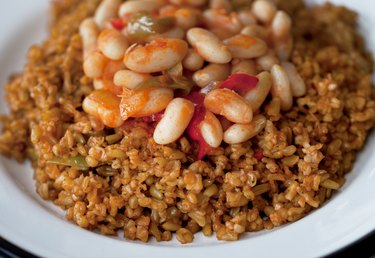
Bulgur is best known for its starring role in tabbouleh. But this classic Middle Eastern salad is also a healthful and delicious pick for the millions of people who live with diabetes or are at risk for developing the disease.
Video of the Day
Video of the Day
Diabetes occurs when your body no longer produces the hormone insulin or does not use insulin the right way. Insulin regulates blood sugar or glucose levels, and your cells need insulin to absorb glucose for fuel.
When your cells don't absorb blood sugar efficiently, glucose builds up in your bloodstream. Over time, high blood sugar levels increase the risk for diabetes-related complications, including heart disease, nerve damage and blindness, according to the American Diabetes Association.
The Lowdown on Bulgur
What's so special about bulgur? A lot, says Audrey Koltun, RDN, CDE, a dietitian in the Division of Pediatric Endocrinology at Cohen Children's Medical Center in Lake Success, New York.
For starters, bulgur is a carbohydrate, and it's also considered a whole grain, she explains. "It has protein, a lot of fiber and is a good source of healthy nutrients," Koltun says. "Bulgur wheat is much better to eat for someone with diabetes compared with pasta, couscous and white rice [because] it causes less of a spike in blood sugar."
Due to its high fiber content, bulgur takes longer to digest, which is why blood sugar levels remain stable. Bulgur packs about 4 grams of fiber in a half-cup serving and close to 3 grams of protein, according to the USDA. It's also versatile.
Tabbouleh aside, bulgur can be served cooked with nuts and fruits for breakfast or over a bed of greens for a healthy lunch.
Bulgur and Diabetes
Carbs like bulgur have a direct effect on blood sugar levels, which is why counting carbs is considered a good way to keep your blood sugar levels in check if you have diabetes, the Centers for Disease Control and Prevention notes. A carb serving is about 15 grams of carbs, and one serving or 1/2 cup of bulgur has about 17 grams of carbohydrates, the CDC estimates.
Another way of eating well with diabetes is via the glycemic index (GI), a scale from 1 to 100 that shows how quickly (or slowly) carbs affect your blood sugar. Straight-up carb counting considers the total amount of carbs, while the glycemic index takes into account the quality of the carb, the American Diabetes Association points out. Whole grains rank lower than refined carbs on the GI because of their fiber content and are considered a higher-quality carb.
A big part of the allure is that bulgur can be used instead of other less-healthy carbs, adds Ajaykumar D. Rao, MD, an associate professor of medicine at the Lewis Katz School of Medicine at Temple University and an associate professor in the Center for Metabolic Disease Research at Temple University Hospital in Philadelphia. "Bulgur replaces other types of grains and carbs that may be more deleterious to your health."
The Whole-Grain Truth
Whole grains like bulgur contain the entire seed of a plant — the bran, the germ and the endosperm. By contrast, refined grains retain only the endosperm, the Whole Grains Council explains. Other whole grains worth a try, according to the Council, include amaranth, kamut, spelt, barley, millet, teff, brown rice, quinoa, triticale, buckwheat, rye, wheat berries, oats and wild rice, corn and sorghum.
Not sure if your choice is a whole grain or not? The first ingredient on the label should have the word "whole" in it, the American Diabetes Association points out.
Talk to a registered dietitian or certified diabetes educator about how to incorporate whole grains like bulgur in your diet. Carbs must be balanced with other nutrients such as protein, nonstarchy veggies and healthy fats, Koltun says.
Read more: Nutrition of Bulgur vs. Quinoa
- American Diabetes Association: "Complications”
- Audrey Koltun, RDN, CDE, CDN, registered dietitian, nutritionist and certified diabetes educator, Division of Pediatric Endocrinology, Cohen Children’s Medical Center, Lake Success, New York
- Centers for Disease Control and Prevention: “Diabetes and Carbs”
- American Diabetes Association: “Carbs: Beyond the Basics”
- Whole Grains Council: “What Is a Whole Grain?”
- American Diabetes Association: “Diabetes Superfoods”
- Ajaykumar D. Rao, MD, associate professor, medicine, Lewis Katz School of Medicine at Temple University and the Center for Metabolic Disease Research, Temple University Hospital, Philadelphia
- USDA: "Cooked Bulgur"
- Whole Grains Council: "Whole Grains A to Z"
Is this an emergency? If you are experiencing serious medical symptoms, please see the National Library of Medicine’s list of signs you need emergency medical attention or call 911.